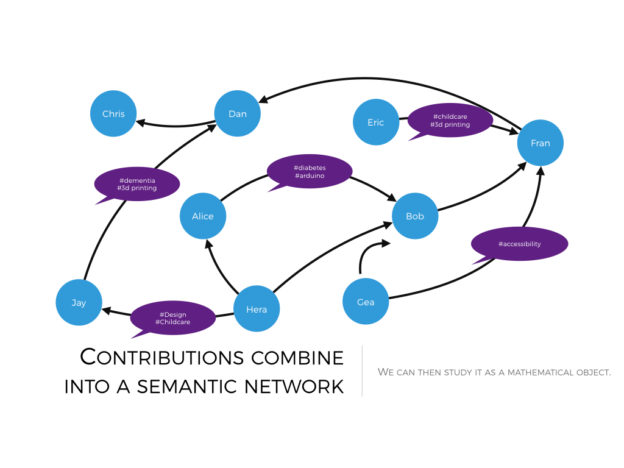In Edgeryders, we study and practice collaboration, especially online. Time and again, we find it the most powerful force that people with next to no wealth and no power, like us, can evoke. We are getting good at it, though much work remains. Proof: we are a mutant company with no office, no investors, no business plan. We have nothing but each other – a tiny core of founders, and the Edgeryders community. And yet we are out there, with top-notch global organizations among our clients, and we are growing. 2016 has been a good year for us – we’ll be blogging about this soon.
2016 has also been a year of uncertainty and discontent in world politics. Many people dear to us are sad, angry or scared. Almost no one seems satisfied about their politics and their leaders. That goes both for the losing camp and the winning one. We consider this contrast, and wonder. As a culture, we are getting better at working together in diversity. Why does this not translate into more constructive politics?
As we looked into this, we realized that our default frame for politics is combat. There are opponents and allies. Its protagonists focus on winning. This is understandable but useless, except maybe as a spectator sport. What happens if we drop this frame and adopt a collaboration frame instead? What would happen if a political entity were run like a collaborative project? What would happen if lawmaking worked like Wikipedia? What if policy happened like the next release of Apache or Ubuntu?
This:
- Enabling as core mission. A state, or city, or region, exists only to enable the people who live there to do what they want to do. It does not need a vision, because people have their own. It only needs to enable the largest possible outcome space for the largest number of people. In return, it gets compliance and tax revenue. This would be the only focus of collaborative politics. Compare with political visionaries, who try to sell you their way of seeing things.
- By default, do nothing. When faced with a proposal for radical reform, the community around a collaborative project discusses it. These discussions can last a long time. Then, almost always, the radical reform does not go ahead. This is because, whatever its other flaws, the project in its current form works. Its next version might be much improved, but no one can guarantee that it will work, and when. Reform needs a rock-solid case to go forward. Compare with I-need-to-leave-a-mark-on-my-term.
- Focus on infrastructure. Collaborative software projects do not make things, but building blocks that people can build things with. Enabling, remember? The point is not to decide which color is best for people’s web pages, but to write code that allows anyone to easily choose any color for their own page. In the policy world, this means building infrastructure– and infrastructure is hierarchical. The more general, the better. Aqueducts are better than hospitals. Hospitals are better than arts centers. Arts centers are better than exhibitions. Compare with bullshit pet projects of elected representatives (“Let’s make an incubator for social innovation”).
- Unglamorous leaders. Narcissistic, flamboyant personalities do not do well in collaborative projects. People’s attention needs to be on building, so attention seekers are a liability. The most respected members of these community are nerdy, reliable people that won’t waste your time. Compare with modern politicians near you.
- Avoid controversy. Any successful open source project has lots of controversial proposals for moving forward. But it also has many on which everyone agrees. Controversy is a waste of time, so people go for the low-hanging fruit first, and build the things everyone agrees on first. This builds mutual trust, and might take the project in directions that make the controversy disappear altogether. Compare with politics-as-combat.
- Do-ocracy, not stakeholder representation and deliberation. Stakeholder representation has served us well when societies were simple and hierarchical. In those salad days, a dozen people around a table could make decisions, and depend they would be acted upon. This no longer possible. In a collaborative project we don’t discuss what to do. Within the (broad) core values of the project, you can do whatever you want as long as you have the capacity to deliver it. Who does the work calls the shots. No one gets to tell others how they should contribute. Compare with endless debates and cross-vetoes everywhere.
You get the idea. This how we work when we build online encyclopedias and web server software. Or companies like Edgeryders. Could this be how we work when we build our cities, national parks and energy grids? Could we do that not in the name of an ideology, but simply to build our own happiness, and that of those we love?
Could there be another space to get down to building? A terrain so hyperlocal and fragmented as to be too expensive for narcissistic strongmen and Machiavellian schemers to enter? A move so lateral that it will not even exist in the same space as post-truth politics?
We don’t know, yet. But, in the wake of the dark tide of 2016, we see people in our network asking new questions. Something new, something big is on the move. As always, we will stand by our community, and help as best we can. If you, too, have been waiting for something to get in motion; if you want to be a part of building it, and figuring out where it takes, get in touch. Nadia will be revealing some of our immediate plans at AdaWeek in Paris, on November 22nd (info): if you can’t make it there, get in touch with her or join our mailing list.
[written with Nadia El-Imam]


